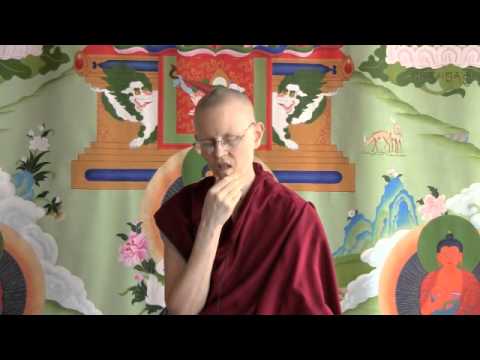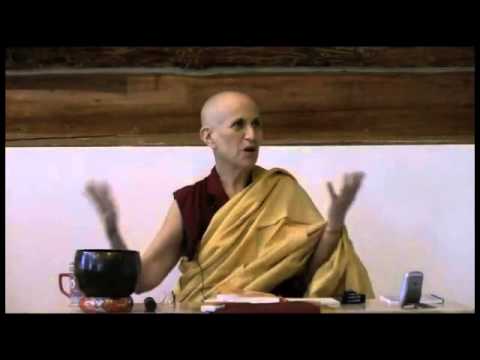Purifying non-virtue: Malice
Part of a series of teachings given at the Winter Retreat from December 2011 to March 2012 at Sravasti Abbey.
- The meaning of maliciousness
- The karmic branches that make an act of malice complete
- The karmic result of malice
Vajrasattva 26: Purification of mind, part 3 (download)
We’re moving on to our favorite topic—maliciousness. We’re on the three mental non-virtues and this is the second of the three. Maliciousness is planning to hurt others, and maybe take revenge—things like that. So it’s thinking about harm, thinking and planning harm. This could come up for many reasons. We might just have plain old hatred or wanting revenge; or we could be competing with people and be rivals; or we could hold a grudge against somebody and maybe if they’ve apologized, we haven’t really been able to let go of our anger so we still have this energy inside where we want to hurt others.
Using the branches that we were talking about related to karma, the object is any sentient being. Then the harder parts to describe are the next ones because it’s like one thought flowing into the next. The complete intention is we recognize the being for who they are; and we recognize that we could hurt them, that they could be hurt if we carry out our plans. Our intention is a wish to harm. And then the affliction is anger. The kind of thinking that might be going on at that time would be something like: “Wouldn’t it be nice if they had some misfortune?” “I wish I could get my revenge.” It’s not so well developed yet but if it has enough fuel it would go on to the action which is next: “Hmm, that looks really good, I think I’m going to do it. I’m going to harm this person.”
The non-virtue of maliciousness
It’s kind of weird to think about your mind thinking this way. When Venerable Chodron has talked about this in the past, I’ve kind of always reacted like, “I don’t have revenge. I don’t have this.” But that’s not the case. I don’t get to the planning for things that I usually recognize. [laughter]
The completion is we start to think about exactly how we’re going to do it and our intention becomes very firm. At that point we say, “I’m really going to get this guy and this is how I’m going to do it.” So that’s when it’s complete—the thought is complete at that point. It’s been a flow of thoughts.
I actually find that this doesn’t come up so much for me. But I can recognize things that are similar. For example, I don’t see myself as planning revenge very often. But I can recognize things in my mind that I don’t categorize as revenge way that actually fall into this category so to speak. So I think you have to look at your own mind and experiences to discern this. Like I don’t really think I have that revenge in me but then, you know, you have a thought that comes by: “They deserve that!” You feel like that, you know. You just have to find how it comes up in your own mind.
With both this maliciousness and also the previous one non-virtue we talked about which was coveting, they’re not just a passing thought. Those don’t rank as coveting or maliciousness. It’s really something that we put energy into; and to have it full blown we’ve really thought about it. That’s why it’s important that we catch our afflictions early. We’re always trying to recognize them early—so we can kind of cut them before they get a lot of energy behind them—and then it just gets harder and harder to control them or stop them. Things that start more mildly can be recognized and stopped. If you’re thinking in a certain way, it always goes down the same old path. You have to change your thinking for the result to change. That’s one thing I did learn living here. If I think the same way it always comes out the same.
What’s not happening in your mind for this non-virtue in particular but it’s actually true for all of the non-virtues is that you’re really not considering others and you’re not holding onto your integrity. When they talk about integrity in Buddhism, they’re talking about a kind of a self respect where we have values that we want to live by. It’s a really great thing to focus on in your practice. Of course we can’t always live up to our values. But we can when we see ourselves going astray, we can pull ourselves back and say, “No, that’s not what I want to do.” We can feel quite good about our values and this respect that we give ourselves for that. Integrity can really be a very helpful force in your practice, as well as consideration for others. In both of these we’re not going to harm others—we’re going to stop any harm. The first one is because of our own values that we have, and the second is because we’re considering that we don’t want to harm others.
This thought process that kind of goes along and goes along and plans and finally comes up to these complete actions—this is what in a court of law they might call premeditated. This is how you get there. This is the premeditated part of any crime. So, once these thoughts go this way a lot of them turn into actions like stealing, killing—the actions of the body or the speech.
The result similar to the cause
The result similar to the cause for maliciousness is that you feel guilty. Why would that be? Well basically, what is your mind doing when you’re being malicious? You’re thinking of harming others. You’re thinking about inflicting harm in some way—somehow the person’s going to feel miserable. And what happens is that kind of turns on yourself. We turn the maliciousness on ourselves in a way and we feel guilty about what we we’re thinking about. It also that can lead to things like fear or paranoia. This is what I recognize in myself: suspicion, ill at ease—because sometimes I find I’m fearful or ill at ease. Actually during this retreat we’re now doing once I was recognizing how my mind goes through a kind of suspicion. This was helpful for me to learn about. It was like, “Wow! The result of something I’ve done in the past makes my mind sometimes a little “setup” to be more fearful in certain situations, or not trusting as easily. And so this is what you get! This is the result of my previous actions.” It’s also helpful to understand this because then you can reverse it though purification.
I just want to finish with this one quote that I find quite helpful for sorting my way through things in my practice. This is from Geshe Sopa and he says:
The most important thing to do in the beginning is to take refuge in the Three Jewels. This is the way to enter deeply into the teachings of the Buddha. The next step is to examine causality, drawing from examples from your own experience until you’re convinced that positive actions result in happiness and non-virtue leads to unhappiness. Strong trust in the relationship between cause and effect is the basis for living a life of virtue and engaging in spiritual training. To obtain happiness and to avoid misery, you have to accumulate their causes—practicing virtue and eliminating non-virtue.
That’s important to remember. What are the causes of happiness? We don’t usually say, “To practicing virtue and eliminating non-virtue.” It’s not our first thought. Watch your mind and see for yourself. Then Geshe Sopa goes on to say:
But it’s not easy to control your actions. It requires great mental and physical effort. If you do not have confidence in the truth and the benefits of the practice you will not be able to change your attitude and behavior. This is why faith or confidence in karmic causality is the root of all happiness, from worldly joy up to the bliss of supramundane happiness, liberation and enlightenment.
Let’s go do it.
Venerable Thubten Tarpa
Venerable Thubten Tarpa is an American practicing in the Tibetan tradition since 2000 when she took formal refuge. She has lived at Sravasti Abbey under the guidance of Venerable Thubten Chodron since May of 2005. She was the first person to ordain at Sravasti Abbey, taking her sramanerika and sikasamana ordinations with Venerable Chodron as her preceptor in 2006. See pictures of her ordination. Her other main teachers are H.H. Jigdal Dagchen Sakya and H.E. Dagmo Kusho. She has had the good fortune to receive teachings from some of Venerable Chodron's teachers as well. Before moving to Sravasti Abbey, Venerable Tarpa (then Jan Howell) worked as a Physical Therapist/Athletic Trainer for 30 years in colleges, hospital clinics, and private practice settings. In this career she had the opportunity to help patients and teach students and colleagues, which was very rewarding. She has B.S. degrees from Michigan State and University of Washington and an M.S. degree from the University of Oregon. She coordinates the Abbey's building projects. On December 20, 2008 Ven. Tarpa traveled to Hsi Lai Temple in Hacienda Heights California receiving bhikhshuni ordination. The temple is affiliated with Taiwan's Fo Guang Shan Buddhist order.


